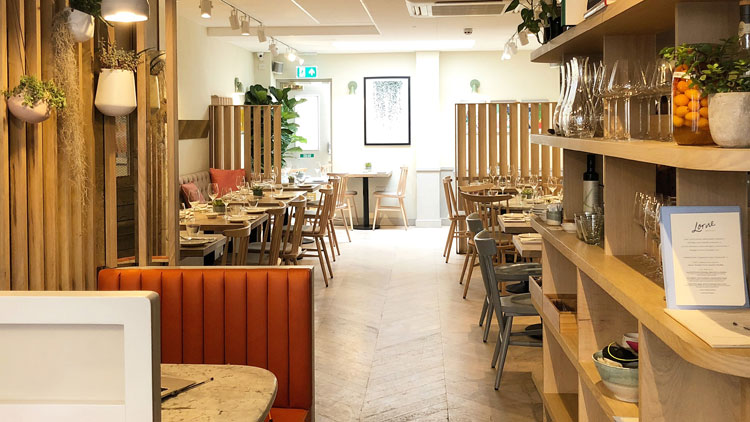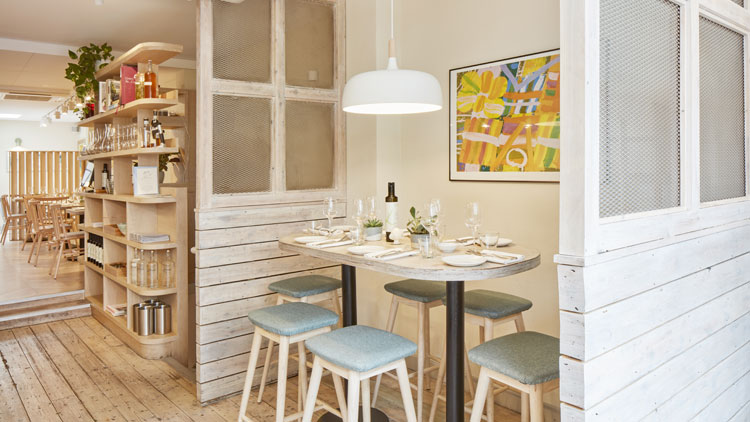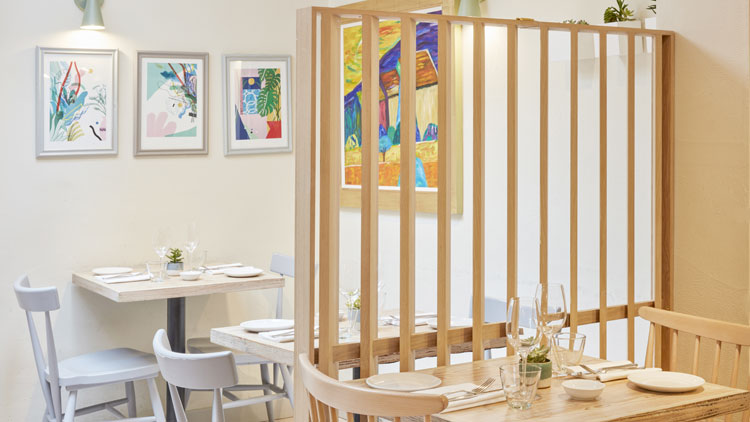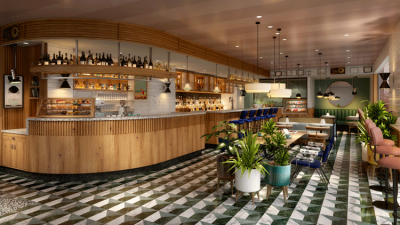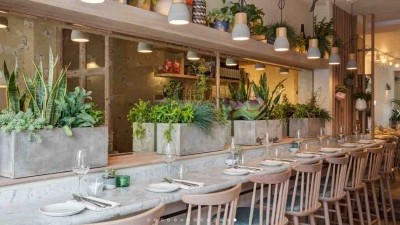Deep water: how London restaurant Lorne survived flooding to reopen

Lorne’s lunch service on Tuesday 29 May was a bit busier than expected but otherwise unremarkable. At least it was until about 3.30pm. “It had been raining heavily but we didn’t think much of it, although it probably made the dining room clear out a bit earlier than usual,” recalls Katie Exton, who co-owns the business with chef Peter Hall.
There was just one table left in the restaurant when a waitress informed Exton that there was a ‘leak’ downstairs. “I just brushed it off at the time because we were still serving and it sounded minor,” she says.
Water was coming into the lower ground floor kitchen from upstairs. It was just an inconvenience at first – the chefs mopped it up as best they could – but within a few minutes, water was cascading into the kitchen.
“We tried to catch the water in bins and run it back upstairs, but it was hopeless,” says Hall. “After five minutes, it became an exercise in damage limitation. We got expensive kitchen gadgets and IT equipment up high and turned off the electrics.”
The water started to subside after about 90 minutes and the team worked until the early hours drying out and sanitising the lower ground floor. Exton and Hall were shaken, but had not yet realised the gravity of the situation.
“Maybe it was the adrenaline, but we thought it would close us for a couple of days, and that was bad enough,” says Exton. “We’ve both worked in places where there have been issues with water. The restaurant attitude is that you get on with it and that tomorrow it will be OK.”
It was only when those experienced in assessing flood damage came in the next day that the severity of the situation started to dawn. “The guy from Thames Water came in, took a quick look downstairs and immediately said we needed to call our insurer and that we would not be open again for some time,” says Hall.
The two biggest issues were that the electrics had been badly damaged and that – in the flood’s latter stages – water had come up through the toilets, which had serious hygiene implications. It wasn’t simply a case of letting the downstairs dry out and then getting back to normal, as the pair had originally thought.
Once Exton and Hall got the insurers involved it started to feel a bit more real. “That was probably the worst moment because there was a lot of uncertainty. At that point we didn’t know if our insurer would pay out and whether we would ever get Lorne back open,” says Exton.
Rising from the damp
To the pair’s relief, Lorne had the requisite cover and, three months after the incident, it reopened. But six months on, the pair’s frustration is evident. “It was going so well. We worked so hard to pay our staff on time and to pay our suppliers on time. We built a reputation over those first 15 months,” says Exton, who – with zero cash flow and bills piling up – had to email suppliers and ask them to help spread payments.
The whole of the downstairs had to be stripped out – a painful thing to witness when your business has only been open for 15 months. “It wasn’t a case of fixing things, It was a case of starting again,” says Hall. “It was all new stuff so if we’d got it fixed and it had gone wrong again, we would not have been covered by the warranty.”
Exton is a sommelier by trade so Lorne has an unusually valuable cellar for a restaurant of its size (£25,000). Luckily, best practice in cellar management is to put the most costly wines up high where they’re less likely to be damaged, so only about £2,000 worth of wine had to be thrown away.
The pair admit they did not put a huge amount of thought into choosing their insurance cover, but they were sensible enough to get advice from peers who suggested they employ the services of a specialist broker.
“We had a good broker. They talked us through it and we mostly went with their recommendations,” says Hall. “Being new, we had to guess the value of some things because we hadn’t been fully billed for them. We didn’t intend to cut corners but a lack of experience meant we weren’t as comprehensively insured as we could have been, but our mistakes were minor enough to not cause too much of a problem.”
As is the case for almost all restaurant leases, Exton and Hall are responsible for everything in the building except the bricks and mortar. As per the lease, Lorne did not have to pay rent while the premises were being refitted (the landlord would have had to have claimed the unpaid rent from its own insurer).
Crucially, its policy covered business interruption – something a lot of restaurants are not insured for. Without this, Lorne would almost certainly have closed for good. Even with this type of insurance, Exton and Hall still had to make the case that their current team were an essential asset to the business.
“Our staff are salaried, which made it a lot easier for us to fight the case that they weren’t casual members of staff,” says Exton. “If we’d had staff paid by the hour, it would have been tricky. We showed the insurers TripAdvisor reviews to prove that our business is built on our staff forming relationships with guests over time. For Lorne to be able to get back on its feet as quickly as possible we simply had to have those staff stay on.”
Exton and Hall weren’t too prescriptive about how they wanted the team to spend the 90 days of the restaurant’s forced closure. “We sat them down and told them that we wanted them to use the time as an opportunity to learn and progress,” says Exton. “On coming back, we wanted them to have done something that was beneficial for their growth professionally and as a person, and also of benefit to Lorne.”
The pair offered to help set up placements at other restaurants, which some staff members took them up on. Some people worked the whole time, others treated it as a three-month holiday. “We get it,” says Hall. “It’s a unique opportunity to have a long break, which you rarely get during your working life.”
The pair also organised trips to suppliers, including Lorne’s butcher, fish supplier and wine supplier.
Keeping the look
A restaurant that was longer in the tooth would almost certainly have reopened with a new look but, with Lorne being less than a year-and-a-half old, it made sense to stick to the same design.
“From an insurance claim perspective, it was much simpler and quicker to use the original plans,” says Hall. “We were able to say ‘here’s how much it cost last year, and here’s how they’re quoting this year’.” Half the builders were the ones on the project the first time round, which further sped up the process.
The two most significant changes are some booth seating in the dining room and a more hard-wearing floor downstairs.
In spite of a respectable insurance payout, the business – and, by extension, the pair themselves – have taken a big financial hit. Lorne is unlikely to be profitable for at least another year, probably longer.
Yet the signs since reopening have been positive. The restaurant has been busy since it reopened and the pair are up on last year’s trading figures. “We’re also seeing the same growth as we did last year, which is good news,” says Hall.
The pair are now able to acknowledge the positives that have come from the incident, not least three months free from the day to day of a busy restaurant. “Being able to rest properly has really helped,” says Exton. “I’ve enjoyed working and owning our restaurant so much more since the flood happened. We’ve come back focused and more mature.”
The incident has also given them the opportunity to take a step back and reflect on the first 15 months of Lorne. “Our restaurant could have closed for good,” says Exton. “We’ve tried to keep that in mind.”
This interview first appeared in the December 2018 issue of Restaurant magazine, the leading title for the UK's restaurant industry. For more features, comment, interviews and in-depth analysis of the sector subscribe to Restaurant magazine here.
